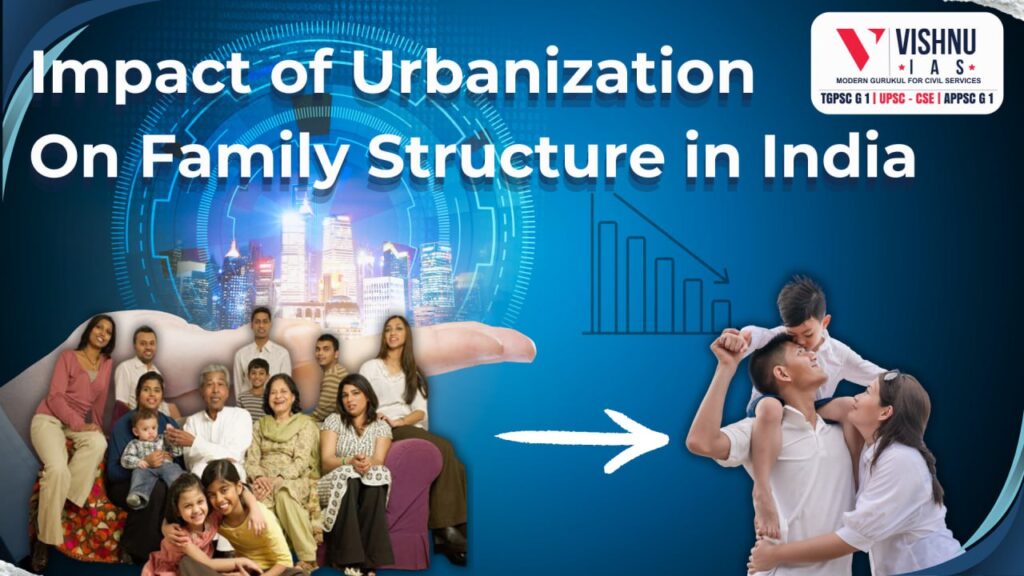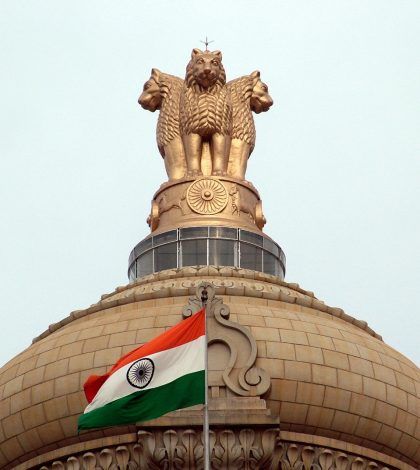Impact of urbanization on family structure in India
⦁ Introduction: conceptual introduction about family
⦁ Body: various impacts of urbanization on family with present relevance and significance
⦁ Conclusion: balanced conclusion in contemporary context
INTRODUCTION
⦁ The family as a social institution is changing same as other institutions. The changes differ in different degrees in different countries based on intensity of industrialization, urbanization and feminism.
⦁ Urbanization refers to the process by which rural areas transform into urban areas, characterized by an increase in population density and the expansion of infrastructure, services, and economic activities. It involves the migration of people from rural to urban areas in search of better opportunities, leading to the growth of cities and towns
BODY
Impact of urbanization on family structure in India
Characteristics of Urbanization
⦁ Individualism as a norm.
⦁ Appetite for better living standards.
⦁ Socio-cultural heterogeneity (different groups under one roof).
⦁ Formality has become a norm.
⦁ Cultural change or culture shock.
⦁ Unconcerned attitude.
Impact on family
⦁ In urban areas, there is improved public services which enabled the families to rise their standard of comforts.
⦁ Increase in nuclear families.
⦁ Entertainment medium became priority.
⦁ Heterogeneity led to impersonal, superficial social relations.
⦁ Family ceased to be a principle primary group, a reliable buffer or permanent shelter in terms of adversity.
⦁ Everything is self-interest oriented.
⦁ Marriage, the foundation of family ceased to be a religious sacrament. It has become a civil contract; it can be broken at any time.
Urbanization has significantly influenced family structures and dynamics in India. Here are some key impacts, along with examples:
⦁ Shift from Joint to Nuclear Families:
⦁ Traditional Joint Families: Historically, Indian families were predominantly joint families, where multiple generations lived together under one roof, sharing resources and responsibilities.
⦁ Rise of Nuclear Families: Urbanization has led to the rise of nuclear families, consisting of parents and their children. This shift is driven by factors such as increased mobility, employment opportunities, and the desire for privacy and independence.
⦁ Example: In metropolitan cities like Mumbai and Delhi, the high cost of living and space constraints make nuclear families more practical. Many young couples prefer to live independently rather than with extended family.
⦁ Changes in Family Roles and Responsibilities:
⦁ Gender Roles: Urbanization has contributed to changing gender roles within families. Women are increasingly participating in the workforce, leading to more egalitarian family structures where both partners share household responsibilities.
⦁ Example: In urban areas, dual-income households are common, and men are more involved in childcare and domestic chores compared to rural settings.
⦁ Impact on Intergenerational Relationships:
⦁ Reduced Intergenerational Support: The shift to nuclear families can lead to reduced support for elderly family members, who traditionally relied on the joint family system for care and companionship.
⦁ Example: In cities, elderly parents may live alone or in old-age homes, as their children move out for work or personal reasons.
⦁ Influence on Marriage and Kinship:
⦁ Marriage Patterns: Urbanization has influenced marriage patterns, with an increase in love marriages and inter-caste marriages. The anonymity and diversity of urban settings provide more opportunities for individuals to choose their partners.
⦁ Example: Matrimonial websites and dating apps are popular in urban India, reflecting a blend of traditional and modern approaches to finding a life partner.
⦁ Social Networks and Support Systems:
⦁ Weakened Kinship Ties: Urbanization can weaken traditional kinship ties, as families become more individualistic and less reliant on extended family networks.
⦁ Example: In urban settings, social support often comes from friends, colleagues, and professional networks rather than extended family.
CONCLUSION
⦁ Urbanization has brought about profound changes in family structures and dynamics in India. While it has led to greater independence and changing gender roles, it has also posed challenges such as reduced intergenerational support and weakened kinship ties. Understanding these impacts is crucial for addressing the social and economic needs of urban families in contemporary India.
Anthropology Full Course at Vishnu IAS Academy
What does Course Offer?
- 4 Months (250+ Class Hours)
- Online (App + Web) / Offline / Hybrid Mode of Classes
- Live + Recorded Videos Access For 1 Year
- 2 Hour Live Class From Monday to Saturday (1.5 Hours for Class + ½ Hour for Doubt Solving)
- Foundation to Advanced Level of Teaching
- Simple and Integrated Content
- One Stop Solution Books
- Regular Value Added Content
- Current Affairs & Case Studies Modules
- Daily Answer Writing Practice
- Weekly Grand Tests On Sundays & Evaluation With Guidance and Topper Will be Rewarded
- 500+ Model Answers
- 9 AM – 9 PM Support System
- Free GS Current Affairs
- Free Interview Guidance for Anthropology


